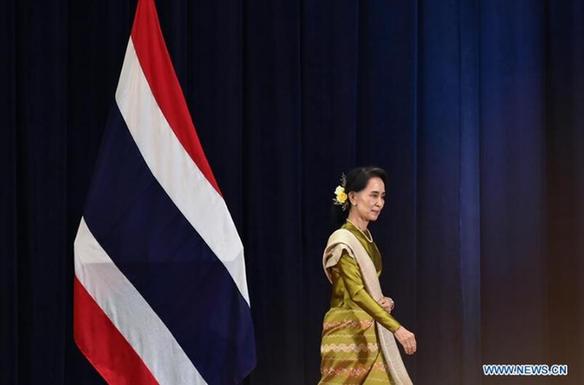Aung San Suu Kyi's gov't completes 1st year
- By Niranjan Sahoo
 0 Comment(s)
0 Comment(s) Print
Print E-mail China.org.cn, April 25, 2017
E-mail China.org.cn, April 25, 2017
|
|
|
Myanmar State Counsellor and Foreign Minister Aung San Suu Kyi walks to deliver a lecture entitled "Myanmar, ASEAN and the World: The Way Forward" at the Thai Ministry of Foreign Affairs in Bangkok, Thailand, June 24, 2016. [Xinhua file photo] |
It must be recalled that, after 60 years of successive military dictatorships, ethnic conflicts and mismanagement of the economy, the military junta surprised everyone by announcing democratic elections in 2015. The NLD party won with promises to accelerate economic growth, create millions of jobs, resolve the ethnic conflicts and push for inclusive development.
Of course, Suu Kyi's government has no magic wand to wield to deliver on many promises, some being very daunting. It was totally inexperienced, barring a handful of ministers (especially ones drawn from the military); in fact, most officials were former political activists with little experience in running day-to-day government that requires practical experience and complex skills.
Therefore, any evaluation of NLD's performance must take these liabilities into account along with the challenges the new government inherited.
On critical issues of economic growth, peace and reconciliation, the NLD government's record has been rather uninspiring. While the new government maintained a decent GDP growth rate of 6.4 percent in 2016, it was 7.3 percent under the junta in 2015.
While the government has been able to attract new investment in critical infrastructural sectors and healthcare, the figures have been disappointing for the job-oriented extractive industries and the service sector. Given weak capacity and fragile economic institutions, the NLD is still struggling to provide a clear direction to the economy.
Further, while economic acceleration is very important for the country with millions of poor, Suu Kyi's biggest challenge has been managing the peace process involving various ethnic groups. Whereas the previous government under the leadership of President Thein Sein had managed to sign a peace agreement with eight major groups, the NLD government is yet to break any fresh ground on ethnic reconciliation.
While it replaced the junta-backed Myanmar Peace Centre with the Union Peace Dialogue Joint Committee (UPDJC) in 2016 to reset the negotiation process under a modernized framework of the 1947 Panglong Conference that first defined a unified Burma (Myanmar), precious little has been achieved.
In fact, the first meeting held in late summer 2016 had no participation from the armed groups and the planned second meeting has been postponed a number of times. As a result, fighting between the Burmese Army and ethnic groups, particularly the Arakan Army, and the Kokang and Kachin Independent Army continues unabated.
While it would be unfair to expect any immediate major breakthroughs after six decades of ethnic conflicts, one was surely expecting some credible direction on reconciliation. The only major visible turnaround in this, however, is the representation of key minorities in the new government.
For instance, both the speakers and deputy speakers of lower and upper houses are from ethnic minorities. Similarly, Henry Van Thio, a member representing the Chin ethnic group, was appointed as second vice president of the country. Yet, beyond these symbolic moves, the NLD has not really addressed the issues that continue to threaten peace and stability of this very diverse country.
Finally, the handling of Buddhist-Muslim religious conflict involving more than a million Rohingyas has attracted global condemnation. The militant uprising by some members of Rohingyas that led to the deaths of nine policemen in the Kachin province late last year invited massive reprisals from Burmese army involving killings, rape, destruction of homes and denial of critical aids to the displaced population from the community.
The NLD and particularly Suu Kyi have been blamed for not standing up to the army over what international observers have dubbed "silent ethnic cleansing" of the Muslim Rohingyas. In short, the continued plight of Rohingyas is heavily weighing on the performance of Suu Kyi's government.
While the government under Suu Kyi is still very popular and enjoys mass support (it won the majority of seats in recent by-elections), time is running out. With its inability to create a workable blueprint for ethnic reconciliation and lack of strong resolve to address the issues concerning the future of "stateless" Rohingyas, the NLD government is fast losing its credibility and good faith.
How quickly Suu Kyi turns the tides of pessimism against her party and government will determine the future of Myanmar and its democracy.
Niranjan Sahoo is a Senior Fellow of the Observer Research Foundation, New Delhi.
Opinion articles reflect the views of their authors, not necessarily those of China.org.cn.






